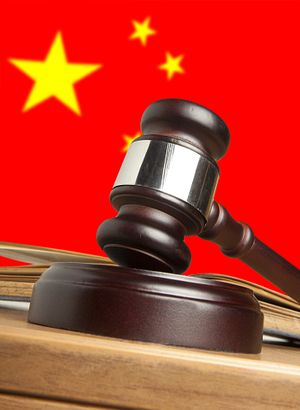This month, the rule of law and China’s legal profession at large have received a lot of attention. This is out of recognition that both will be necessary to advance the country’s economic development, and yet both present a challenge to the Chinese Communist Party’s (CCP) domination of China’s political agenda.
On June 8, the “Hundred Jurists and Hundred Lectures” (百名法学家百场报告会) event on rule of law propagation, known as the “Double Hundred” meeting, took place at the Great Hall of the People in China’s capital. It was there that the Supreme People’s Court Deputy Secretary Jiang Bixin delivered an address on “Implementing the Rule of Law for Guaranteeing the Five Development Concepts.” Jiang explained that economic and social development cannot take place in the absence of the rule of law, and further stated that the current problems arising in China’s development are directly linked to the rule of law’s incomplete development.
The event went on to identify six major tasks to focus on: adhering to Xi Jinping’s important thinking on the construction of the rule of law; implementing rule of law for guaranteeing the five development concepts; bringing economic and social development into the rule of law arena; advancing legal governance and accelerating the construction of a government based upon rule of law; safeguarding national security according to the rule of law; and using rule of law to promote an ecological civilization. The continued linkage of the rule of law with the successful implementation of China’s five development concepts (also called the new development concept), which have been deemed necessary for seeing China through its current economic woes, shows Beijing’s commitment to its development in a multitude of non-threatening areas.
However, it has been difficult for China’s leadership to fully contain the rule of law—and those that advocate for it—to areas that don’t challenge the CCP’s monopoly on politics. For that reason, on June 14, the General Office of the CCP and its counterpart in the State Council published their “opinions” on deepening the reform of China’s lawyer system (关于深化律师制度改革的意见). The need to reform the system stems from its current perceived faults, which in the government’s eyes have allowed the nation’s human rights lawyers to dare to challenge the state in the defense of their clients both in the court of law and public opinion arenas. In order to strengthen the “correct” political orientation of the country’s attorneys, the opinions called for Party committees at all levels of government to pursue reforms that include: altering professional standards to regulate lawyers’ behavior, enforcing disciplinary measures that include penalties for firms that violate behavior standards, and targeting lawyers with propaganda to create a “positive atmosphere” for industry reform.
Recent events have not only been limited to the domestic realm, as China’s lawyers are also slated to play a role in advancing the country’s ambitious foreign policy agenda. The China Law Society, which is the legal profession’s mass organization directly under the CCP’s leadership, pledged on June 16 to help the nation address the myriad of legal issues it is bound to face in its push to create burgeoning trade relations under the “One Belt, One Road” framework. At a meeting with a delegation of more than 150 representatives from the “One Belt, One Road” International Research Institute (Hong Kong) in Beijing, China Law Society’s president and vice president, Wang Lequan and Chen Jiping, explained how the society would play an important role in strengthening the OBOR framework through promoting legal research and exchanges with their OBOR partners, by drawing on its legacy of contributions to lawmaking and legal institutions.
The Chinese government could certainly use all of the help it can get. As legal experts at the University of Oxford point out, a massive cross-border undertaking such as OBOR will require legal structures that can deal with complex issues spanning topics such as international trade, finance, investment, banking and securities, maritime and transport, competition, consumer protection, and dispute resolution.
In summary, recent legal trends point to the continued CCP conviction that the rule of law and the Chinese legal profession are critical for the country to reach its development and foreign policy goals. Nevertheless, the perceived need to manage China’s lawyers, like the perceived need to manage other non-public sectors, stems from the fear that they are politically unreliable, and not necessarily resolute in their loyalty to the Party. Lawyers perhaps pose the strongest risk to the regime, as they can leverage the country’s laws to moderate or challenge the CCP’s power. We can expect these contradictory legal trends to continue to comprise the political space that China’s legal profession will evolve in for the near term.
David Gitter is the editor and Great Helmsman of PARTY WATCH, the premier weekly intelligence report on the activities of the Chinese Communist Party.

































